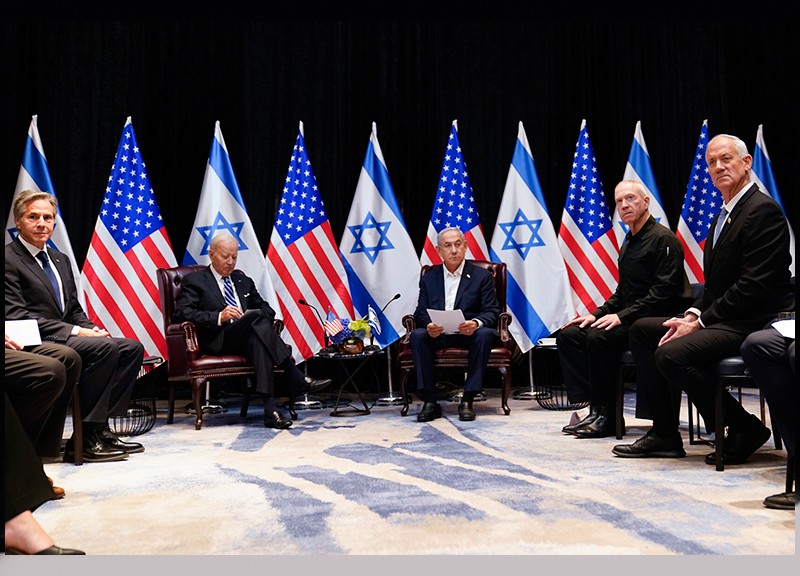
Washington’s envoy has led talks but big obstacles remain because of a lack of trust on both sides
Raya Jalabi in Beirut, James Shotter in Jerusalem, Felicia Schwartz in Washington and Neri Zilber in Tel Aviv / Financial Times
The US is stepping up efforts to broker a diplomatic solution to the intensifying hostilities between Israel and Lebanon’s Hizbollah, as fears grow in Washington that the window is narrowing to avert a full-blown war erupting on the shared border.
On a trip to Beirut last week, US envoy Amos Hochstein, who is spearheading the talks, floated to Lebanon’s caretaker prime minister the idea of a deal for an interim cessation of hostilities between Israel and the militant group that would be followed by a longer-term solution, according to people briefed on the discussions.
However, those people said the talks were still in their early stages and that significant obstacles remained as both Israel and Hizbollah had ratcheted up cross-border attacks on each other in recent weeks.
“Diplomacy and war are in a race right now — and we’re not sure which one is going to win,” said one of the people familiar with the discussions. The pro-Hizbollah Lebanese newspaper Al Akhbar on Tuesday said Hochstein’s visit to Beirut was being interpreted as “the last warning before a major escalation”.
Israeli officials have publicly demanded that Hizbollah forces withdraw some 30km inland to the Litani River, as mandated by a long-ignored UN resolution, but the recent talks have focused on a smaller withdrawal of 10km in an apparent bid to secure a compromise between the parties.
Israel is also pushing for an additional 15,000 members of the Lebanese military to be deployed to the border areas, according to people briefed on the talks, in keeping with the same UN resolution. Less than a third of that number are thought to be stationed in southern Lebanon, according to three people with knowledge of Lebanon’s security operations.
Washington has privately raised the potential for a US-led economic aid package to Lebanon. A deal would involve more western support for the Lebanese military, one of the few independent institutions in the country but which has been severely weakened by a devastating economic crisis.
The war between Israel and Hamas that began on October 7 has triggered intensifying hostilities across the region. As well as Hizbollah’s clashes with Israel, Houthi rebels in Yemen have attacked merchant ships in the Red Sea, and Iran-supported militants have fired missiles and drones against US forces in Iraq and Syria.
While the exchanges between Israel and Hizbollah have been largely contained, they have steadily intensified, including a suspected Israeli strike this month which killed senior Hamas leader Saleh al-Arouri in southern Beirut, Hizbollah’s stronghold. On Tuesday, Israel unleashed its heaviest barrage of strikes against southern Lebanon.
Each incident has raised the spectre of miscalculation, and heaped pressure on the border. “Hizbollah saw the Arouri killing as a violation of its rules of engagement with Israel . . . and won’t accept Israel taking it one step further,” said one person familiar with the group’s thinking.
Under pressure from Washington, Israel’s government is allowing time for diplomacy, but has not ruled out force. Benjamin Netanyahu, Israel’s prime minister, has said that if talks fail “we will work in other ways”, as his far-right government has made it clear that it will no longer accept Hizbollah fighters on its border and believes their withdrawal from the frontier is essential to allowing 80,000 displaced Israelis to return to the north.
“We have given [Hizbollah] an example of what is happening to its friends in the south; this is what will happen here in the north,” Netanyahu told troops in northern Israel last week. “We will do everything to restore security.”
Meanwhile, Hizbollah’s senior leaders have said Israelis displaced from the north will not be safe to return home until Israel halts its offensive in Gaza. “Israel . . . must first stop the war in Gaza so that the war in Lebanon stops,” Hizbollah’s deputy chief Naim Qassem said in a recent speech.
Despite such public remarks, officials and diplomats with knowledge of the situation say both sides have shown private willingness to “seriously” seek a diplomatic solution and avoid a costly war. “Hizbollah are being flexible, but they want guarantees from Israel first,” one of the people said, adding that Hizbollah was, at the very least, open to discussing the border demarcation.
Another said the group had shown “willingness to discuss everything” without laying down “firm red lines”. But a lack of trust on both sides could put a deal out of reach, these people warned.
Israeli leadership is mindful of the threat that Hizbollah’s arsenal of 150,000 rockets, drones and missiles can wreak on Israel’s cities. But the country’s calculus has changed since the devastating Hamas attack on October 7, which underscored its vulnerability to cross-border assaults.
“Despite the fact that both sides aren’t seeking a war, the moves they’re making increase the possibility of one,” said Assaf Orion, a retired Israeli brigadier-general. “We’re approaching the moment of truth.”














